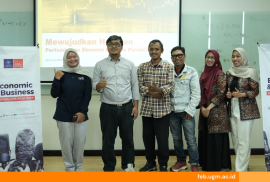Data from the Demographic and Health Survey (DHS), long recognized as a source of health information, actually hold significant potential for cross-disciplinary analysis. This was demonstrated during the Demographic and Health Survey (DHS) Data Processing Workshop organized by the Microeconomics Dashboard (Micdash) study group of the Faculty of Economics and Business UGM on Saturday, 16 November at the FEB UGM.
Flora Aninditya, a researcher from the Demographic Institute of the Faculty of Economics and Business UI, presented the workshop. It aimed to introduce the methods and benefits of analyzing data from the Demographic and Health Survey (DHS). The session included presentations on introducing the DHS, weighing samples in the DHS, recording DHS variables, preparing DHS data for analysis, and analyzing DHS data.
Flora explained that the DHS is a survey conducted in many developing countries with technical assistance from the USAID DHS program in America. Indonesia is one country that conducts the DHS, known as the Indonesian Demographic and Health Survey (IDHS) or Survey Demografi dan Kesehatan Indonesia (SDKI).
“This survey contains health information, especially on mothers and children. Although it is called a Demographic and Health Survey, DHS data can be used for multidisciplinary analysis, including economic, demographic, social and gender dynamics,” she explained on Saturday (16/11).
Flora emphasized the unique structure of DHS data, which differs from typical questionnaires. This requires a unique approach to data management and analysis.
“There are features in Stata that can be used to manage DHS data,” she said.
Flora hoped to improve participants’ understanding of managing and analyzing DHS data through this training. In addition, participants were expected to use unique features in Stata to support their data analysis. This workshop provided technical insights and opened new perspectives on the broad benefits of DHS data, positioning it as a strategic tool for multidisciplinary research in a data-driven era.
Reportage: Orie Priscylla Mapeda Lumalan
Editor: Kurnia Ekaptiningrum
Sustainable Development Goals









